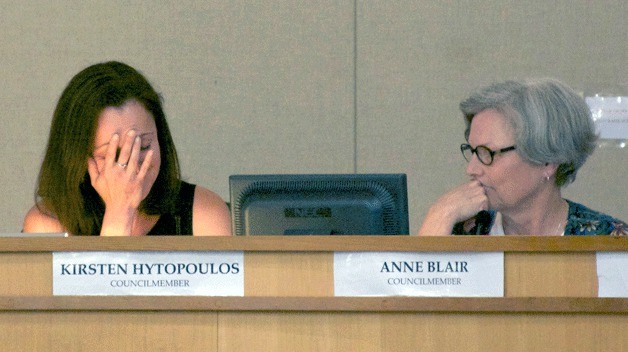A 30-percent cut in water rates was put on the fast track Wednesday after the Bainbridge Island City Council brought it one step closer to a vote.
The next step may put the rate reduction into effect.
Mayor Steve Bonkowski pressed the proposed cuts during this week’s council meeting, following through with his vow to add the measure to the agenda despite bitter criticism from others on the council last week.
The council approved — by a 4-2 vote — directing City Manager Doug Schulze to draft an ordinance that would cut rates by 30 percent for all customers of the city’s water utility.
Schulze will present the ordinance on July 24.
The mayor justified his proposed reduction with a memorandum from Schulze that analyzed Bonkowski’s water utility agenda. Schulze wrote that a rate cut would be sustainable for period of time, most likely years. The utility’s reserve funds would be tapped to cover the costs of the rate cut.
Bonkowski said that the reduction was the product of working with Schulze to determine the best possible reduction.
Councilwoman Kirsten Hytopoulos questioned that version of events, however. Instead, she claimed Schulze had no option but one that was based on a 30-percent reduction.
“I don’t feel that the characterization of how this number came about and what this memo said is accurate to the community,” she said.
“I believe what happened is that [Schulze] was provided the number of 30 percent and asked to take a look at how (it) would affect the utility.”
“It’s not simply that he found that this is sustainable,” Hytopoulos added.
Councilwoman Anne Blair was also wary of the rush to cut water rates.
She urged her colleagues to employ “wisdom and informed judgment” to review the idea, and advised her fellow council members not to take short-term gains at the cost of possible long-term losses.
“I do not believe there is an emergent need to make this decision today, or even next week, or in the month of July,” Blair said. “Rates are in line with our neighboring utilities.”
Blair said that she is open to consider rate cuts, but the council should not act in a vacuum and work with the city manager and staff.
“We don’t need to do this at this very moment,” she said. “There is a process. We need to honor it.”
The rate cut scheduling wasn’t the only part of Bonkowski’s agenda that was passed. The council voted unanimously to begin an update to the city’s water system plan, and also directed Schulze to develop an allocation policy for the utility.
The city manager will also be expected to draft a resolution affirming that the city’s utilities be managed for the benefit of customers. The motion passed with a 4-2 vote.
Blair and Hytopoulos questioned the logic of the motion, each noting that state law already requires the utilities be managed for the benefit of customers. They said a city resolution would therefore be pointless.
Bonkowski insisted the resolution would clear up any misconceptions about the utility’s purpose, and that the community has long asked for such a clarification.
He said that the word “benefit” could bear many meanings — from the utility’s finances to services — and he wanted Schulze to help define it.
Hytopoulos also felt that the sentiment leaned too close to the legal battle that has engulfed the city and the operation of its water utility.
“We are making a statement that is the mantra of the Ratepayers Alliance,” Hytopoulos said, noting the group that has brought a lawsuit to the city over the utility.
“What this is doing is acknowledging some guilt on the part of the city that I don’t believe exists,” she said.



